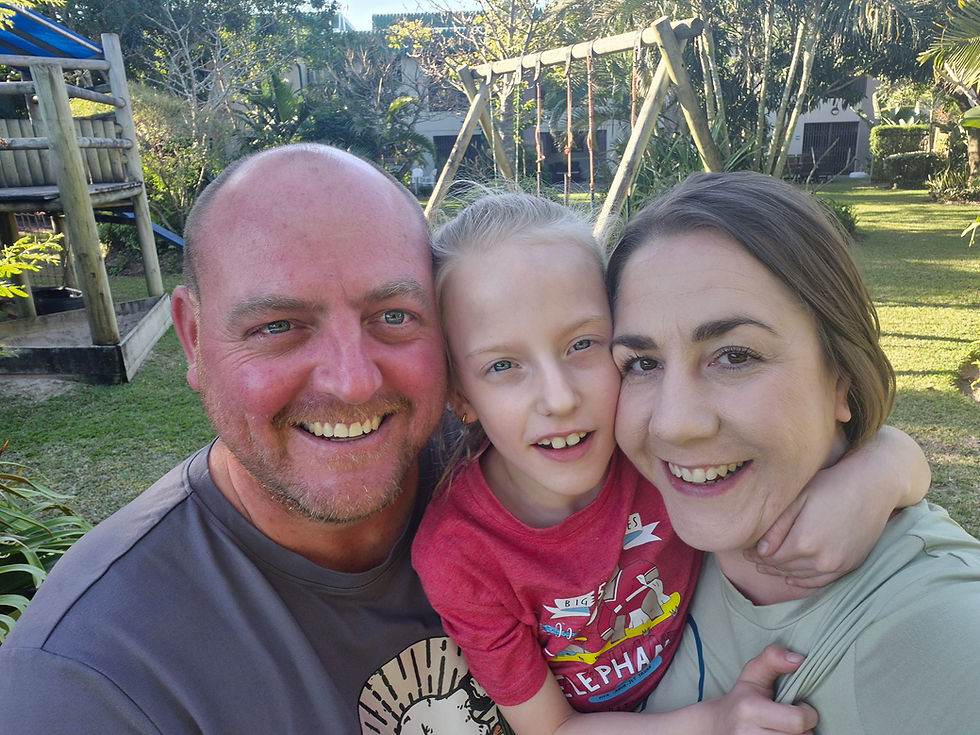Raising Awareness for Pitt Hopkins Syndrome: A Journey with My 6-Year-Old Daughter
- Hlumela Tshijila

- Sep 18, 2025
- 3 min read
In March of this year, our family received a diagnosis that changed our lives — Pitt Hopkins Syndrome. As we navigate this new reality, we want to shed light on this rare genetic disorder, share our daughter's remarkable spirit, and raise awareness for others affected by Pitt Hopkins.
Pitt Hopkins Syndrome (PHS) is a rare neurodevelopmental disorder caused by mutations in the TCF4 gene. Characterized by intellectual disability, severe speech delays, breathing irregularities, and distinctive facial features, PHS affects each individual differently. Due to its rarity, many healthcare providers and families are unaware of this syndrome.

My husband and I have been married for almost 11 years. We had our struggles with getting pregnant and even underwent infertility treatment. After giving up all hope, we got pregnant spontaneously. I gave birth to Tianke in October of 2018.
We have known since birth that Tianke was different and has some struggles. Our pediatrician guided us while we started with physiotherapy at 6 months, had an MRI at 10 months, which was normal, and ultimately ended up with our pediatric neurologist. We underwent various testing and started all round therapy with a speech therapist and occupational therapist, which we still attend today. She only started to walk after the age of 3 years, she is still non-verbal, un-aware and not potty trained.
Our pediatric neurologist was convinced Tianke has some sort of genetic disorder, but we could never diagnose it. Our geneticist got us enrolled in a research program in 2022, where they perform whole-exome sequencing on Tianke, myself and my husband, but was advised it could take years for the results to come back.
We had no diagnoses for years, and it did not really bother us too much, as it would not change our treatment plan, until 2024. This is when one of Tianke’s scariest and strangest features started to happen. She started to hyperventilate and then holding her breath until she passes out. We could not leave her alone for a moment, as she would crash and fall on the floor or off the bed. We even bought her a scrum cap so she wouldn’t hurt her head, talk about supporting the Springboks. We had to get all-round nanny’s and/or grandparents to look after her during the day, as we had to take her out of school, because my husband and I have full-time work and cannot work from home. All our specialists were flabbergasted with this new feature. Our pediatric neurologist even shared some videos of her doing this to other specialists to see if anyone knows how to control this. We tried various medications and different ideas from people, but nothing seemed to work.
During to course of the following months, the occurrence would become less, and then at times, she would do it more often. We learned to live with it and even Tianke’s school navigated around it. It also really seemed to be aggravated when she is over-stimulated and unregulated.
In March of this year, we got a call from our geneticist that the research project results were in. We went to meet a whole team of supporting doctors and therapists. It was confirmed, Tianke was diagnosed with Pitt Hopkins Syndrome, where the TCF4 gene on chromosome 18 has mutated. Neither me nor my husband carried this gene, it was a spontaneous mutation during conception.
Obviously, I immediately started googling and doing research on this syndrome, only to find that one of the features of Pitt Hopkins syndrome, was hyperventilating and breath holding. Relief flushed through my husband and myself, as not only was there a reason for her doing this, but there might be some treatment to controlling this. We are still in the process of trying the recommended medication etc, but there is definitely hope.
Tianke attends Rise Neurodiversity centre, where Jessica and her great team work with special needs kids with all different diagnoses. They teach the children to use AAC (Augmentative and Alternative Communication) devices to communicate. It is a slow progress with Tianke, but I am sure before long she will be calling me mommy from her device.

Our daughter is a bright, joyful 6-year-old who continues to inspire us every day. Since her diagnosis, we've learned so much about her unique challenges and strengths. Despite her difficulties with speech and coordination, her laughter, curiosity, and determination shine brightly. She is loved by her whole family, her grandparents, uncles, aunts, nephews, nieces and anyone that crosses paths with her. She is a lovable, charismatic girl, who just wants a lot of love, hugs and kisses and that is what we give her every day.
On Pitt Hopkins Awareness Day, we honour our daughter, Tianke, and all children and families affected by this syndrome, and the hope for a brighter future through awareness and research.



Comments